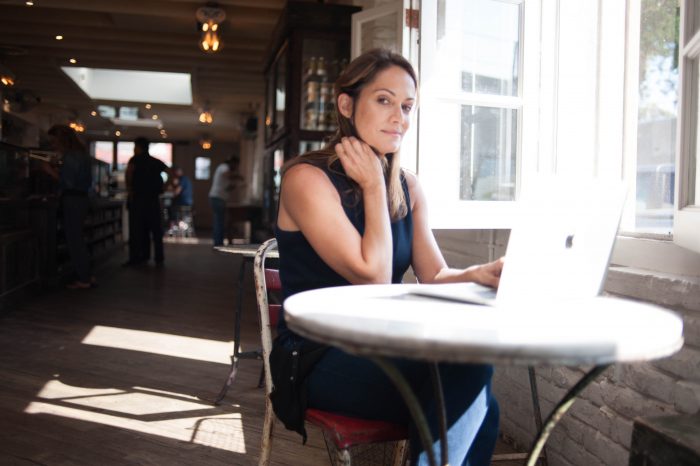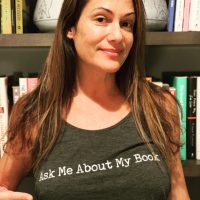We are in the midst of what is undeniably the most challenging time for mental health most of us have experienced. I have been taken down by it at times myself. But that’s why I believe we should all be writing.
Whaaa? I hear you screech. We need to be sleeping enough and eating well and exercising and going to therapy or whatever else we do to keep ourselves mentally stable. Well, yes. And we should also be writing. Hear me out.
When I first decided I wanted to be a writer, I was seven years old. The motivating factor was The Guinness Book of World Records, which I’d just perused—and discovered that the youngest book author was six. I had been struck by two simultaneous, intense emotions—one was “Wait, kids can do this? Why has everyone been keeping this from me?” The second was disappointment; I couldn’t set the world record for youngest author. As the child of parents with exceedingly high expectations, I somehow felt like a failure before even starting.
I certainly didn’t know then that the reason I wanted to write was a desire to make sense of my emotions and heal. I’ve always been an intense emote-er—and writer. I started keeping a journal at the age of 10 and the first entry was a diatribe against a PE teacher who I felt was picking on me. I graded my days. The day of the PE teacher rant, I graded my day an F-.
I continued to keep a journal though I did ease up on the grades (a day Mom took us to McDonalds got an automatic A+ no matter what else transpired). I also began submitting stories to magazines. I still have a rejection letter from when I was 12; it’s from the editor of a children’s magazine who thanked me for sending him my story about getting a splinter but said, alas, he didn’t have space for it in his magazine.
I wasn’t discouraged. At least I don’t remember being discouraged. I wanted to be published but mostly I wanted to purge through the page. Feelings, thoughts and experiences are so very complicated and while talking them out can help, I only feel like I can get true clarity, and healing, when I’ve crafted them into sentences I can read.
In college, I chose to major in Creative Writing—a decision motivated not (clearly) by a practical mind but really a lazy one: you mean I can get through this major without having to take a single test?! Declaring this as a major taught me something surprising: after a certain point, writing can’t really be taught. The writing lessons I had been given earlier—read this book and argue a point that may or may not be correct because we don’t have access to Chaucer or Fitzgerald so it’s really just the teacher’s opinion on whether or not you’re correct—weren’t helpful. If the number of people I’ve seen who struggle to make their overly academic writing sound interesting and authentic is any indication, early writing classes are actually the opposite of helpful.
The only writing lessons I’ve had that have helped me were about structure, and those usually only took a few minutes. Whether it’s “follow this 10-chapter structure” or “make it three acts,” having a guideline to hang words on is incredibly useful, at the very least because it makes sure you won’t just be staring at a blank page.
The only writing class I liked before I got to college was an eighth-grade one taught by a sweet man named Mr. Graulich. He just let us write. My first story was about my sixth-grade math teacher, a man rather ironically named Mr. Mein. He hated girls and I felt he especially hated me. Purging those feelings by writing about the mean math teacher who couldn’t have had a more perfect name if Chaucer himself had named him brought me relief. I wasn’t the victim of a bullying teacher. I was a heroine who had survived an experience. While exacting revenge through the pen is complicated, as Annie Lamott famously said, “If the people in our lives wanted us to write warmly about them, they should have behaved better.”
But writing as a form of superiority is an empty game; much like devouring a dozen Oreos, it only seems to feel good. Writing as a way to understand ourselves better is, in the end, far more satisfying. After all, as Mary Karr has said, “If anyone’s going to be an a-hole in your writing, let it be you.”
I’ve found that it’s easier to admit to my character defects, selfish thoughts and overall dysfunction on the page than it is in conversation. Defenses are down, truth serum is being spilled. When I wrote my first story that counted toward my college major, I remember weeping as I typed. I vowed then that I only wanted to create work that would make me emotional.
It was a tall order. When I graduated from college with what I soon learned was an utterly useless degree, I tried to make it as a writer who could write weep-worthy words. And I was both successful and unsuccessful—successful because I actually started to get paid as a writer immediately after graduating and unsuccessful because my work was for my magazines, mostly entertainment magazines. Writing up an interview with a movie star isn’t the sort of thing tears are made of—unless it’s Juliette Binoche, who was so mean to be me once that I did actually cry.
When I began writing books, I was able to rediscover the healing power of writing. After eight books and hundreds of articles, you might think I’d be fully healed. And I would be if life didn’t have a way of hurling new lessons at us all the time, making the concept of healing completely through writing a goal as likely to be met as becoming the world’s youngest author when you’re already older than the one who set the record.
In my current career—as a publisher and writing coach—I have a front-row seat for the sort of healing that writing can bring. In fact, I firmly believe that everyone should be sharing their stories—not only for the freedom it gives the writer but for the hope it can give the reader. Those who don’t have the inclination to write can find ghostwriters to help. And those who do want to do it themselves can get some direction. The only other way to learn is to keep doing it. Writing is rewriting, as the saying goes. And with each rewrite, you get closer and closer to the truth—where healing lies.
My new book, which walks you through my struggles and how I used them to write books before showing you how you can write a memoir based on your own messy life and then use that to help others is available at www.makeyourmessyourmemoir.com.








Read 0 comments and reply